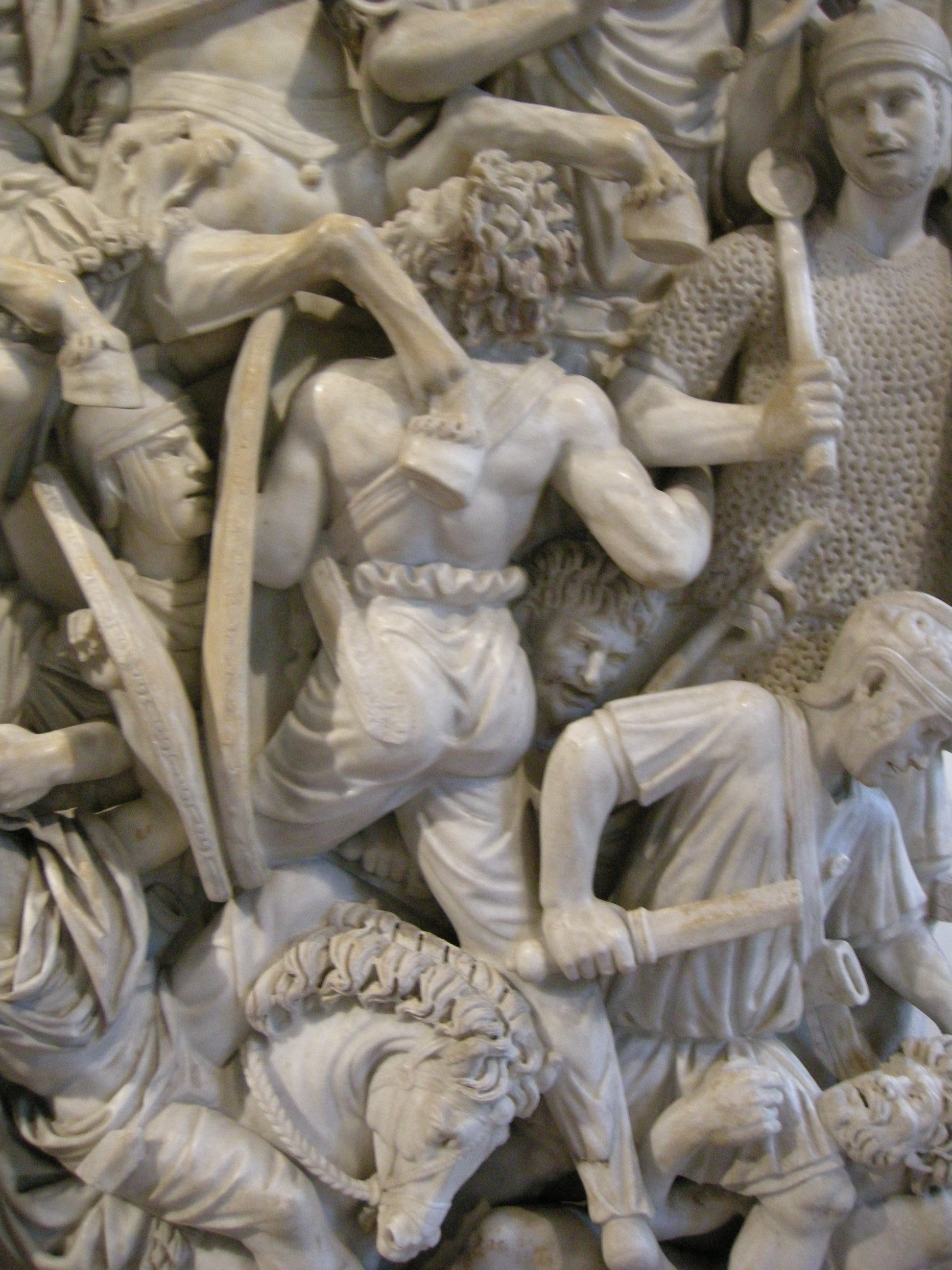Braccae on:
[Wikipedia]
[Google]
[Amazon]
 is the Latin term for "
is the Latin term for "
 The word is
The word is
online
trousers
Trousers (British English), slacks, or pants are an item of clothing worn from the waist to anywhere between the knees and the ankles, covering both legs separately (rather than with cloth extending across both legs as in robes, skirts, and ...
", and in this context is today used to refer to a style of trousers made from wool
Wool is the textile fibre obtained from sheep and other mammals, especially goats, rabbits, and camelids. The term may also refer to inorganic materials, such as mineral wool and glass wool, that have properties similar to animal wool. ...
. According to the Romans, this style of clothing originated from the Gauls
The Gauls ( la, Galli; grc, Γαλάται, ''Galátai'') were a group of Celtic peoples of mainland Europe in the Iron Age and the Roman period (roughly 5th century BC to 5th century AD). Their homeland was known as Gaul (''Gallia''). They sp ...
.
were typically made with a drawstring, and tended to reach from just above the knee at the shortest, to the ankles at the longest, with length generally increasing in tribes living further north.
For the Romans
Roman or Romans most often refers to:
*Rome, the capital city of Italy
* Ancient Rome, Roman civilization from 8th century BC to 5th century AD
*Roman people, the people of ancient Rome
*''Epistle to the Romans'', shortened to ''Romans'', a lette ...
, to encircle the legs and thighs with ''fasciae'', or bands, was understood, in the time of Pompey
Gnaeus Pompeius Magnus (; 29 September 106 BC – 28 September 48 BC), known in English as Pompey or Pompey the Great, was a leading Roman general and statesman. He played a significant role in the transformation of ...
and Horace
Quintus Horatius Flaccus (; 8 December 65 – 27 November 8 BC), known in the English-speaking world as Horace (), was the leading Roman lyric poet during the time of Augustus (also known as Octavian). The rhetorician Quintilian regarded his ' ...
, to be a proof of ill health and effeminacy. Roman men typically wore tunic
A tunic is a garment for the body, usually simple in style, reaching from the shoulders to a length somewhere between the hips and the knees. The name derives from the Latin ''tunica'', the basic garment worn by both men and women in Ancient Ro ...
s, which were one-piece outfits terminating at or above the knee.
Etymology
The word originates from theGaulish
Gaulish was an ancient Celtic language spoken in parts of Continental Europe before and during the period of the Roman Empire. In the narrow sense, Gaulish was the language of the Celts of Gaul (now France, Luxembourg, Belgium, most of Switze ...
, after going through a process of syncopation
In music, syncopation is a variety of rhythms played together to make a piece of music, making part or all of a tune or piece of music off-beat. More simply, syncopation is "a disturbance or interruption of the regular flow of rhythm": a "place ...
it gave rise to "trouser, pants".
cognate
In historical linguistics, cognates or lexical cognates are sets of words in different languages that have been inherited in direct descent from an etymological ancestor in a common parent language. Because language change can have radical ef ...
with the English ''breeches
Breeches ( ) are an article of clothing covering the body from the waist down, with separate coverings for each leg, usually stopping just below the knee, though in some cases reaching to the ankles. Formerly a standard item of Western men's c ...
''. It appears to derive from the Indo-European
The Indo-European languages are a language family native to the overwhelming majority of Europe, the Iranian plateau, and the northern Indian subcontinent. Some European languages of this family, English, French, Portuguese, Russian, Du ...
root '- "break", here apparently used in the sense "divide", "separate", as in Scottish Gaelic
Scottish Gaelic ( gd, Gàidhlig ), also known as Scots Gaelic and Gaelic, is a Goidelic language (in the Celtic branch of the Indo-European language family) native to the Gaels of Scotland. As a Goidelic language, Scottish Gaelic, as well as ...
("trousers"), in Breton ("pants"), in Irish ("trousers") and in Welsh
Welsh may refer to:
Related to Wales
* Welsh, referring or related to Wales
* Welsh language, a Brittonic Celtic language spoken in Wales
* Welsh people
People
* Welsh (surname)
* Sometimes used as a synonym for the ancient Britons (Celtic peopl ...
. The Celtic form may have first passed to the Etruscan language
Etruscan () was the language of the Etruscan civilization, in Italy, in the ancient region of Etruria (modern Tuscany, western Umbria, northern Latium, Emilia-Romagna, Veneto, Lombardy and Campania). Etruscan influenced Latin but was eventua ...
, which did not distinguish between the and sounds. Transition through Etruscan accounts for the Greek being rendered as Latin , Greek () as Latin .
Bibliography
*Collis, John (2003). The Celts: Origins, Myths, Inventions, Tempus. *Wells, Peter S (2001). Beyond Celts, Germans and Scythians, Duckworth Debates in Archaeology. *Oppenheimer, Stephen (2006). The Origins of the British, Constable & Robinson. * Hazel Dodge,Peter Connolly
Peter William Connolly FSA (8 May 1935 – 2 May 2012) was a British scholar of the ancient world, Greek and Roman military equipment historian, reconstructional archaeologist and illustrator. He was a regular contributor to such periodicals a ...
: ''Die antike Stadt. Ein Leben in Athen und Rom.'' . Kapitel ''Kleidung''.
* August Mau: ''Ἀναξυρίδες.'' In: ''Paulys Realencyclopädie der classischen Altertumswissenschaft'' (RE). Band I, 2, Stuttgart 1893ff., Sp. 2100 f.
* James Yates: ''Bracae.'' In: William Smith: ''A Dictionary of Greek and Roman Antiquities.'' John Murray, London 1875, S. 213online
References
{{Historical clothing, state=expanded Celtic culture Trousers and shorts